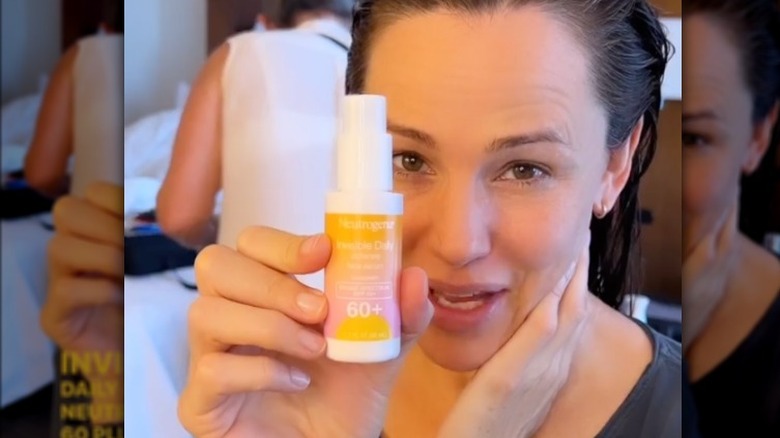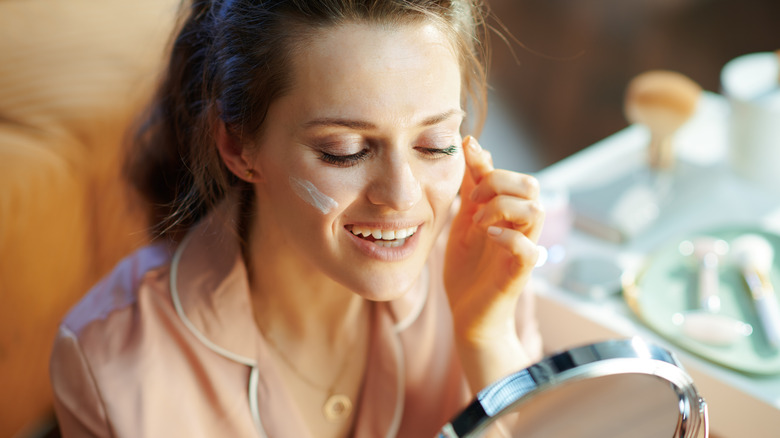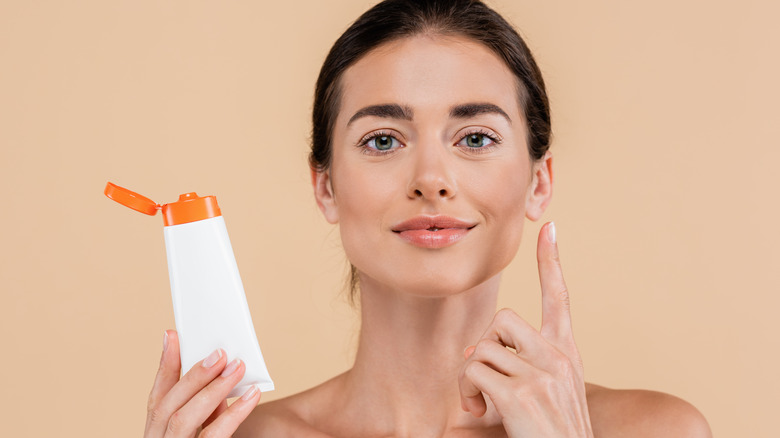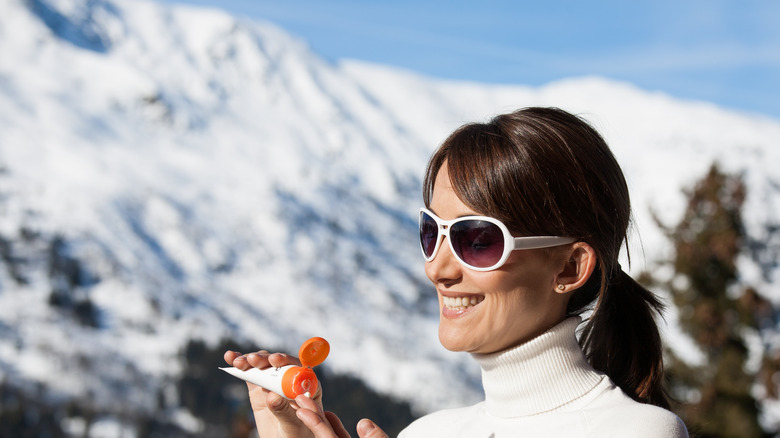11 Reasons You Need To Keep Your SPF On Hand All Winter Long
Most of us wouldn't dare head out to the beach on a sunny vacation, or well, literally anywhere in the summer months without some kind of protection from the sun, right? Right! But what about in the winter? Slapping on some SPF may not be the first thing on our minds during those dreary and sometimes snowy mornings between December and February, but it turns out protecting our skin is just as important during those colder months as it is during the summer.
Yep, there are actually a whole host of reasons why sunscreen in the winter should be a key part of your everyday skincare routine, and we've compiled 11 of the best ones right here that'll have you reaching for that sunscreen or SPF product you pushed to the back of the cupboard after Labor Day.
The sun's ultraviolet rays never go away
Let's kick things off with the basics. You may already be aware every bottle of sunscreen features a label that indicates its "SPF" or sun protection factor, followed by a number between 10 and 100. Per the FDA, that number refers to how much solar energy is needed to burn your skin while wearing that particular product. In other words, the higher the number, the more time you'll be able to spend in the sun without getting burned. That leads us onto our next point. Not all sun rays are equal. The sun gives off ultraviolet rays, known as ultraviolet A (UVA) and ultraviolet B (UVB). As explained by Olay, UVA refers to how the rays can age your skin through side effects like wrinkles, while UVB is about how it can burn your skin.
Now, this is where things get serious. In the words of dermatologist at the University of Texas' MD Anderson Cancer Center, Saira George, "UVA partners up with UVB to cause more serious problems, like skin cancer." But don't be fooled into thinking those ultraviolet rays are only an issue on hot and sunny days. Nope. Those ultraviolet rays never go away. They can penetrate through clouds and are even present when it's raining, which is one of the biggest reasons why it's essential to lather on the SPF in December, just like you do on those popsicle melting July days.
Snow reflects the sun's rays
Now that we know the sun doesn't even need to be visible to damage your skin, that brings us to debunking our next myth; that SPF isn't necessary in snowy situations. Oh, how wrong we were to think this one was true! In reality, days spent having fun in the snow are the days you probably need sun protection the most. This is because the bright, white snow actually reflects the sun's ultraviolet rays, even more so than water does, In fact, SunSmart claims the snow can bounce back up to 90% of UV rays. In other words, each time you participate in a snowy activity, you're actually getting a double dose of sun rays from the sky and the ground, so sunscreen is a definite must!
But that's not all. Unfortunately, just by spending time at ski resorts (whether or not you hit the slopes), you're already more likely to experience sun damage than you would while at the beach. Why is that? Well, for one, the higher you are in elevation, the closer you are to the sun, and two, the thinner atmosphere at higher altitudes means the sun's rays are even more intense than normal because they have to filter through less air to get to your skin. So next time you get ready to make snow angels during your winter holiday, be sure to cover your face with a good SPF first.
Winter activities can leave your skin vulnerable
In a similar vein, the activities we tend to do during the winter can make skin extra vulnerable to UV rays. If you've ever been lucky enough to participate in winter sports like skiing or snowboarding, you probably know that it can get pretty sweaty under all those layers of snow gear when you're bundled up in coats, hats, and gloves. Well, it turns out all that perspiration make us even more susceptible to sun damage than we might have realized. One 2000 study by M Moehrle, W Koehle, K Dietz, and G Lischka suggested that sweating can sometimes cause the skin to absorb more UV radiation, which is certainly not good news for the face with all those sun rays beating down from the sky and reflecting from the snow on the ground. That certainly makes SPF a must!
Even worse, The Healthy reports that falling snow can actually wash away sunscreen, while harsh winds can render SPF less effective. That's why Maximilian Jagsch, a sun protection expert and CEO of SWOX, explained to SnowTrex that it's a great idea to wear waterproof sunscreen on those winter days spent dashing through the snow if you don't want your skin protection to melt away with the snowflakes. You'll also want to remember to reapply, as the sun protection factor only lasts for two hours at a time regardless of SPF level
Skin can still be susceptible to UV rays indoors
It makes sense to think sun protection is only really necessary in the summer because of how much time we spend outside. But cold weather and days spent in the house aren't enough reason to ditch your sunscreen in the winter. In fact, research suggests you're not totally immune to the sun's rays indoors. Yep, even on those cold days you're snuggled up under a blankie catching up on your Netflix queue, you could be susceptible to UV-related skin damage. Dr. Elizabeth Mullans explained to Fox News, "Not all glass is created equally. It is important to apply daily SPF 30 or higher because harmful UVA rays can penetrate windows." Additionally, Dermatologist Dr. Min Deng pointed out that while windows can protect against UVB rays, they may not offer such protection against UVA.
People who spend a lot of time indoors near windows may have a tendency to get complacent with the sun without realizing how much damage it's doing to their skin. Speaking with NBC News, Dr. Robyn Gmyrek explained, "UVA light causes premature skin aging by breaking down collagen and elastic tissue, contributing to the formation of skin cancers. It does not cause tanning, so you may be unaware of how much UVA exposure you are getting." In other words, it's well worth it to still apply a layer of sunscreen, even if you have no plans to leave the house.
Celebrities swear by it too
It seems like our favorite celebrities have some kind of magic secret that just keeps their skin looking constantly glowing, hydrated, and youthful. We know at least one of those secrets. Yes, they're fortunate to have access to the very best beauticians and skincare specialists in the world, it turns out a lot of our favorite famous faces also swear by protecting their skin from the sun all year long. Hey, if it's good enough for them, it's good enough for us, right?
Amongst those always slapping on the sun protection in winter are Kourtney Kardashian, who told Vogue in her "Beauty Secrets" video, "Every day I put on sunscreen, whether it's rainy or sunny," while former "The Real Housewives of New York City" star Leah McSweeney admitted to Glamour her dermatologist recommended sunscreen to her. "I put it on every day, even in the winter," she shared. Jennifer Garner is equally enthusiastic about daily sun protection, telling Hello Giggles that she's got her friends in on year-round SPF. "I tell my friends, 'Start your day with it. Don't waste any time. You have to do it whether it's overcast like it is today in L.A. or sunny. It's just gotta be part of your routine.'" We couldn't have put it better ourselves, Jen!
Regular sunscreen application can be anti-aging
Want to look 10 years younger? Well, we can't promise you'll instantly wipe away a decade overnight, but applying an SPF product regularly — yep, even in the winter — can at least slow the aging process overall. A 2013 study by Frederic Flament, Roland Bazin, Sabine Laquieze, Virginie Rubert, Elisa Simonpietri, and Bertrand Piot found that exposure to UV rays could be responsible for up to 80% of aging that's visible on the skin. Yikes! Of course, although skin changes over time are inevitable, there's plenty of research to suggest that taking an extra step to prevent sun damage can at least slow down the visible aging process, such as the formation of wrinkles and photo damage
And while plenty of studies have demonstrated sunscreen's effectiveness at preventing wrinkles, the anti-aging benefits may even go one step further than that. A study conducted in 2016 by Manpreet Randhawa, Steven Wang, James J. Leyden, Gabriela O. Cula, Alessandra Pagnoni, and Michael D. Southall actually found that a control group who applied sun protection consistently every single day for a year were able to reverse the visible signs of photoaging on their skin, like dark spot that had appeared. Talk about a miracle product!
Get the most of your product
Although the FDA requires many sunscreens to maintain their original SPF strength for up to three years after they're purchased, per Mayo Clinic, not all dermatologists actually recommend keeping bottles around that long — particularly if they've been opened. "Usually the sunscreen should be valid for 36 months from the date of the production, if not opened. If opened it is usually valid for six to 12 months," Dr Luca Russo, M.D., founder of Dr Russo Skincare, told You Magazine, while Cosmetic Scientist Ian Taylor added, "The longer the sunscreen is open the less effective it will be."
This means if you want to get the most out of the sunscreen you purchase at the beginning of summer, it's probably a good idea to use it continuously through the winter, rather than holding onto it for the following year. When the following summer comes around, it's best to stock up on a new one to prepare for when you need the most protection on those really hot days. "I recommend purchasing new sunscreen every season because you don't want to take any risks when it comes to the sun and your skin," Dr. Joshua Zeichner told Byrdie.
Keep your skin doubly moisturised in its driest perioid
Thanks to harsh winds, plunging temperatures, and countless days spent with the central heat on, our skin can become particularly dry and thirsty in winter, per Cleveland Clinic. That's where sunscreen can transform into the perfect way to add a whole extra layer of moisture on those super dry days, in a way you may not need so much in a hot and sticky summer. Many sunscreens are known to contain hydrating ingredients, like ceramides and emollients, which can combat some of this dryness if you're using it on top of a regular facial moisturizer. We Heart This recommends sun protection with hyaluronic acid or glycerin if your skin is naturally dry, while those who tend to have oily skin more generally will want to go for something with hyaluronic acid or glycerin. If you're more on the sensitive side, you'll want to grab something more natural without any fragrances, parabens, or sulfates.
Of course, while there are plenty of moisturizers out there that give you best of both worlds by containing SPF, some experts still recommend applying the moisturizer and sunscreen separately. Per Byrdie, this is because the concentration of SPF in certain combo products can be diluted, and therefor less effective. Instead, for best results, layer your moisturizer on top of chemical sunscreen, and mineral sunscreen on top of moisturizer.
Winter is a great time to try new SPF products
Though it's likely most of us wait to buy that first bottle of sunscreen when the weather warms up, we'd be doing our future selves a huge favor by already having it on hand in the winter.
Think about it like this: Winter gives you the perfect opportunity to take a new sunscreen for a test drive without running the same level of risk you would during the summer, when you're likely to spend more time with exposed skin in direct sunlight. This is especially beneficial for those with sensitive or blemish-prone skin, as they may need to go through a few different options to find The One.
An extra bonus? If your skin does react badly to a new product (hey, we're all different and, unfortunately, things just won't always work for every skin type), it'll be much easier to keep the irritated area covered up and protected from the sun in the winter. But always remember, if any creams, lotions, sprays or other versions of sun protection ever cause irritation to the skin, stop using it immediately!









